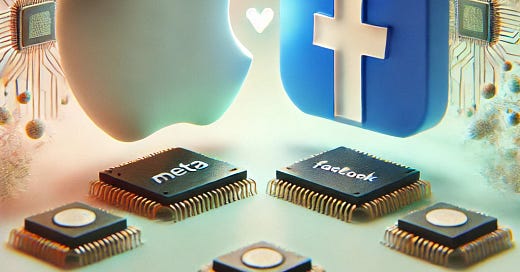Apple and Meta (Facebook) Woo Each Other
Unlikely collaborators, such as Apple Inc. and Mark Zuckerberg’s Meta—owner of the social network Facebook—have come together thanks to the rapid advancements in artificial intelligence (AI). While OpenAI, GoogleAI, and Anthropic—three giants in the AI arena—fiercely compete for dominance, we are witnessing the emergence of unconventional alliances in this highly competitive environment. Apple, a hardware-oriented company renowned for its proprietary microchips, vast distribution network, and staunch emphasis on user privacy, is now forming strategic partnerships. This article, based on multiple news sources including The Wall Street Journal, delves into these intriguing developments, exploring how AI advancements are shaping new collaborations and what this means for the industry’s future.
The Genesis of OpenAI
When Sam Altman co-founded OpenAI in 2015, the AI sector was still in its infancy. However, with groundbreaking products like ChatGPT, Sora, and GPT-4o, OpenAI has grown into an $86 billion behemoth. ChatGPT, in particular, has set new benchmarks in natural language processing, capturing the imagination of users and developers alike.
Apple's Foray into AI
In its quest to catch up in the AI race, Apple has been exploring partnerships with various AI companies, including its long-time rival, Meta. Discussions are underway about integrating Meta’s generative AI model into “Apple Intelligence”, the recently announced AI system for iPhones and other devices, which we covered in our previous articles. This move highlights Apple's strategy to leverage its extensive distribution network through iPhones, similar to the App Store model.
The Competitive Landscape
While Apple has developed its own smaller AI models, it has chosen to collaborate with other companies for more complex tasks. During the Worldwide Developers Conference, Apple announced its partnership with OpenAI, integrating ChatGPT into Apple Intelligence. Craig Federighi, Apple’s Senior Vice President of software engineering, hinted at the company’s aim to offer the best choices for users, mentioning potential partnerships with Google’s Gemini and other AI startups like Anthropic and Perplexity. In addition to Meta and Google, Apple has reportedly held discussions with these startups about incorporating their generative AI models into Apple Intelligence. These potential partnerships do not necessarily involve financial exchanges; instead, companies can offer premium subscriptions through Apple Intelligence, with Apple receiving a share of the subscription revenue.
Meta and Apple's Unlikely Alliance
The potential collaboration between Apple and Meta is particularly noteworthy, given their history of rivalry. Meta's Llama models have gained traction within the tech industry, and a partnership with Apple would significantly bolster Meta's standing in the AI race. Such an alliance would also represent a rare détente between the two companies, which have clashed over issues like mobile device privacy changes and advertising revenue models.
The Strategic Advantage of Distribution
Apple’s extensive distribution network provides a unique advantage for AI companies seeking to reach a broad user base. By integrating various AI models into Apple Intelligence, users will have the flexibility to choose the AI that best suits their needs, from creative writing to medical research. This strategy not only enhances user experience but also mitigates the risk of Apple becoming overly dependent on a single AI provider.
Financial Implications of AI Partnerships
While the integration of AI models into Apple devices offers substantial distribution benefits, the financial impact remains uncertain. OpenAI’s free version of ChatGPT is expected to significantly increase usage, though this will also lead to higher infrastructure costs. Premium subscriptions sold through Apple’s platform could generate substantial revenue, but the exact financial benefits for AI companies will depend on user adoption rates and subscription pricing, and the inter se bifurcation of the revenue between the two entities.
Apple’s Unique Position in the AI Ecosystem
As OpenAI, GoogleAI, and Anthropic vie for the top spot in the AI hierarchy, Apple is strategically positioning itself as a pivotal player. By keeping its options open and not committing to a single partner, Apple ensures it can offer the best AI solutions while maintaining control over its ecosystem. Instead, its talking point becomes harnessing the AI software that is best suited for the needs and preferences of individual users. This approach aligns with Apple's broader strategy of keeping the consumer at the centre and integrating advanced technology without compromising user privacy.
Summing Up: The Future of AI Collaboration
The landscape of AI is rapidly evolving, with traditional competitors forming unexpected alliances to leverage each other’s strengths. As OpenAI, GoogleAI, and Anthropic—of Claude 3.5 Sonnet fame—compete for supremacy, Apple’s entry into the AI space with its proprietary technology and strategic partnerships signals a significant shift. By potentially integrating Meta’s generative AI model and other advanced AI technologies, Apple is no longer a mere observer but a key player in the AI tech business. As the industry watches these developments unfold, it is clear that the future of AI will be shaped by both fierce competition and innovative collaborations, leaving consumers with little to complain about, including their privacy concerns.
If you believe this article would interest someone you know, please feel free to share it anonymously (for us), using any platform that you prefer.





